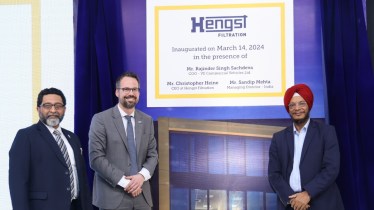With India’s automotive industry growing, more international companies are setting up shop here, owing to the huge potential India has to offer. This applies to automotive and component manufacturers, and the latest to set up a manufacturing facility in Bengaluru is German major Hengst Filtration.
Hengst has been operational in India since 2015, in a JV with Luman Industries, and has now decided to set up shop directly, with a new manufacturing plant and employees. Sandip Mehta will take charge as the Managing Director for India, while Christopher Heine, Group CEO, Hengst Filtration, was present during the ceremony.
Speaking to Express Mobility on why India, Mehta says, “Why not?” India is seeing exponential growth in various fields which require filters. With the expansion of roadways, long-haul commercial vehicles have seen an increase, opening the market for Hengst. Also, with India set to become a big market in terms of manufacturing in the coming years, Mehta recalls shortlisting Bengaluru after visiting 23 locations in two cities the country, and the talent available in the Silicon Valley of India played a key role.
“If we look at where India is growing and going, in terms of infrastructure, manufacturing output, healthcare, and so on, there are many segments that we expertise in,” says Mehta. The company will start manufacturing for the domestic market first, while India also provides the base for Hengst’s operations in other parts of the world. “Export is definitely on our radar, and since we are present globally, we have a global purchasing setup in place, part of this plant.”
With mobility in India transitioning towards electric power, filters need to be specialised. As Heine says, “Electric power is not the choice when it comes to heavy-duty commercial vehicles.” However, with Hydrogen fuel cell trucks becoming a reality in India, Hengst is ready.”
“Filtration for fuel cell vehicles is not simple. The filter needs to take in clean air, not just free of particles but also free of chemicals and gases. The filtration conditions vary from place to place, as air quality changes, and the filter needs to perform consistently, so this is a sensitive field, but we have our technology, as we are in the business and supply them on a large scale to the global market,” adds the Group CEO.
Coming back to the facility, Hengst has invested Rs 17 crore, and the company makes its own assembly lines, as explained by Mehta. “Our lines are flexible, and with relatively lower investment, our innovation cycle can be faster. Our production cells give us two advantages — a short development cycle and the ability to handle large product mixes and variants with less incremental investment.”
The company has started supplies to OEMs from the new facility, and VECV is one of their leading customers. Hengst has taken over Bosch Rexroth, effectively transferring all its customers under Hengst now.
